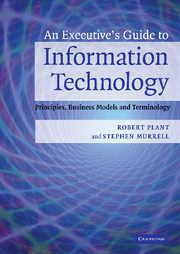Book contents
- Frontmatter
- Contents
- Introduction
- A ACM (Association for Computing Machinery) to Audio
- B Backup to Business process re-engineering
- C C, C++, C# to Cracking
- D Database to Dynamic web pages
- E e-Commerce/e-business to European Union Directive on Privacy and Electronic Commerce 2002
- F Fiber optics to Fuzzy logic
- G to H Global positioning system to Hypertext, HTML
- I ICANN (Internet Corporation for Assigned Names and Numbers) to ISP (Internet service provider)
- J to L Java to Logic programming
- M Machine learning to Multicast
- N Natural language processing (NLP) to Normalization
- O Object-oriented to Outsourcing
- P Packet switching and circuit switching to Public key-private key
- Q to R Quantum computing to RSS (Really simple syndication)
- S Sarbanes-Oxley Act of 2002 (SOX) to Structured design methodologies
- T to U T-Carrier to URL (Uniform resource locator)
- V Value added network (VAN) to Voice over IP (VoIP)
- W W3C (the World Wide Web Consortium) to WYSIWYG
- X to Z X.12 to Zip
- Index
- References
S - Sarbanes-Oxley Act of 2002 (SOX) to Structured design methodologies
Published online by Cambridge University Press: 17 May 2010
- Frontmatter
- Contents
- Introduction
- A ACM (Association for Computing Machinery) to Audio
- B Backup to Business process re-engineering
- C C, C++, C# to Cracking
- D Database to Dynamic web pages
- E e-Commerce/e-business to European Union Directive on Privacy and Electronic Commerce 2002
- F Fiber optics to Fuzzy logic
- G to H Global positioning system to Hypertext, HTML
- I ICANN (Internet Corporation for Assigned Names and Numbers) to ISP (Internet service provider)
- J to L Java to Logic programming
- M Machine learning to Multicast
- N Natural language processing (NLP) to Normalization
- O Object-oriented to Outsourcing
- P Packet switching and circuit switching to Public key-private key
- Q to R Quantum computing to RSS (Really simple syndication)
- S Sarbanes-Oxley Act of 2002 (SOX) to Structured design methodologies
- T to U T-Carrier to URL (Uniform resource locator)
- V Value added network (VAN) to Voice over IP (VoIP)
- W W3C (the World Wide Web Consortium) to WYSIWYG
- X to Z X.12 to Zip
- Index
- References
Summary
Definition: The Sarbanes-Oxley Act of 2002 was enacted to “protect investors by improving the accuracy and reliability of corporate disclosures made pursuant to the securities laws, and for other purposes” (Sarbanes-Oxley Act of 2002, Report 107-610).
Overview
The Sarbanes–Oxley Act of 2002 was a response to the financial reporting and disclosure problems associated with companies such as Enron, whose 2001 collapse was the largest bankruptcy in US history. This large and complex act pertains to corporate governance practices in public companies and contains eleven titles:
Public company accounting oversight board
Auditor independence
Corporate responsibility
Enhanced financial disclosures
Analyst conflicts of interest
Commission resources and authority
Studies and reports
Corporate and criminal fraud accountability
White-collar crime penalty enhancements
Corporate tax returns
Corporate fraud and accountability
While the act is wide-reaching in scope and focuses on corporate and executive accountability for financial data, the maintenance of internal control structures, and the role of accounting firms in the audit process, for the CIO or IT professional it does not contain any specific systems requirements and in fact never even mentions the word computer in its 66 pages. However, it is clear that technology and information systems will be central to corporate compliance with the act.
The eleven titles of the act contain 69 sections, several of which are regarded as key from a CIO's perspective, including the following.
Information
- Type
- Chapter
- Information
- An Executive's Guide to Information TechnologyPrinciples, Business Models, and Terminology, pp. 289 - 314Publisher: Cambridge University PressPrint publication year: 2007
